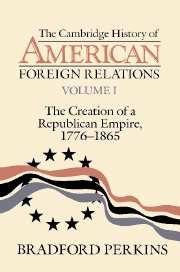Book contents
- Frontmatter
- 1 The Canvas and the Prism
- 2 The Birth of American Diplomacy
- 3 The Constitution
- 4 Federalist Diplomacy: Realism and Anglophilia
- 5 Jefferson and Madison: The Diplomacy of Fear and Hope
- 6 To the Monroe Doctrine
- 7 Manifest Destiny
- 8 Britain, Canada, and the United States
- 9 The Republican Empire
- Bibliographic Essay
- Index
- THE CAMBRIDGE HISTORY OF AMERICAN FOREIGN RELATIONS
- References
9 - The Republican Empire
Published online by Cambridge University Press: 28 March 2008
- Frontmatter
- 1 The Canvas and the Prism
- 2 The Birth of American Diplomacy
- 3 The Constitution
- 4 Federalist Diplomacy: Realism and Anglophilia
- 5 Jefferson and Madison: The Diplomacy of Fear and Hope
- 6 To the Monroe Doctrine
- 7 Manifest Destiny
- 8 Britain, Canada, and the United States
- 9 The Republican Empire
- Bibliographic Essay
- Index
- THE CAMBRIDGE HISTORY OF AMERICAN FOREIGN RELATIONS
- References
Summary
In 1866, an English magazine, the Spectator, grudgingly observed, “Nobody doubts any more that the United States is a power of the first class, a nation which it is very dangerous to offend and almost impossible to attack.” In the immediate sense, this observation reflected the confirmation of nationhood through Union success in the Civil War. In larger perspective, it reflected an amazing growth of power since the republic’s birth ninety years earlier, little more than the lifetime of John Quincy Adams’s generation.
At the end of the Civil War, the nation’s population exceeded 35 million; Britain and France had fewer people. Although still far behind Great Britain, Americas industrial output nearly equaled that of France and exceeded that of other countries. American agriculture was the world’s most productive. Territory had swelled from fewer than a million square miles in 1783 to exceed 3 million square miles. The arbitrament of war had confirmed the viability of republican government.
The success of the United States owed much to achievements – some earned, some not – in relations with foreign powers. Otto von Bismarck, Germany’s “Iron Chancellor,” is supposed to have said that God seemed to have a special place in his heart for drunkards, idiots, and Americans. Good fortune did seem to fall on the young Republic, perhaps most notably in its escape from the consequences of mismanagement by Jefferson and Madison, but also in such things as the fortuitous dominance over British policy by Shelburne and Aberdeen at critical times.
- Type
- Chapter
- Information
- The Cambridge History of American Foreign Relations , pp. 230 - 233Publisher: Cambridge University PressPrint publication year: 1993

